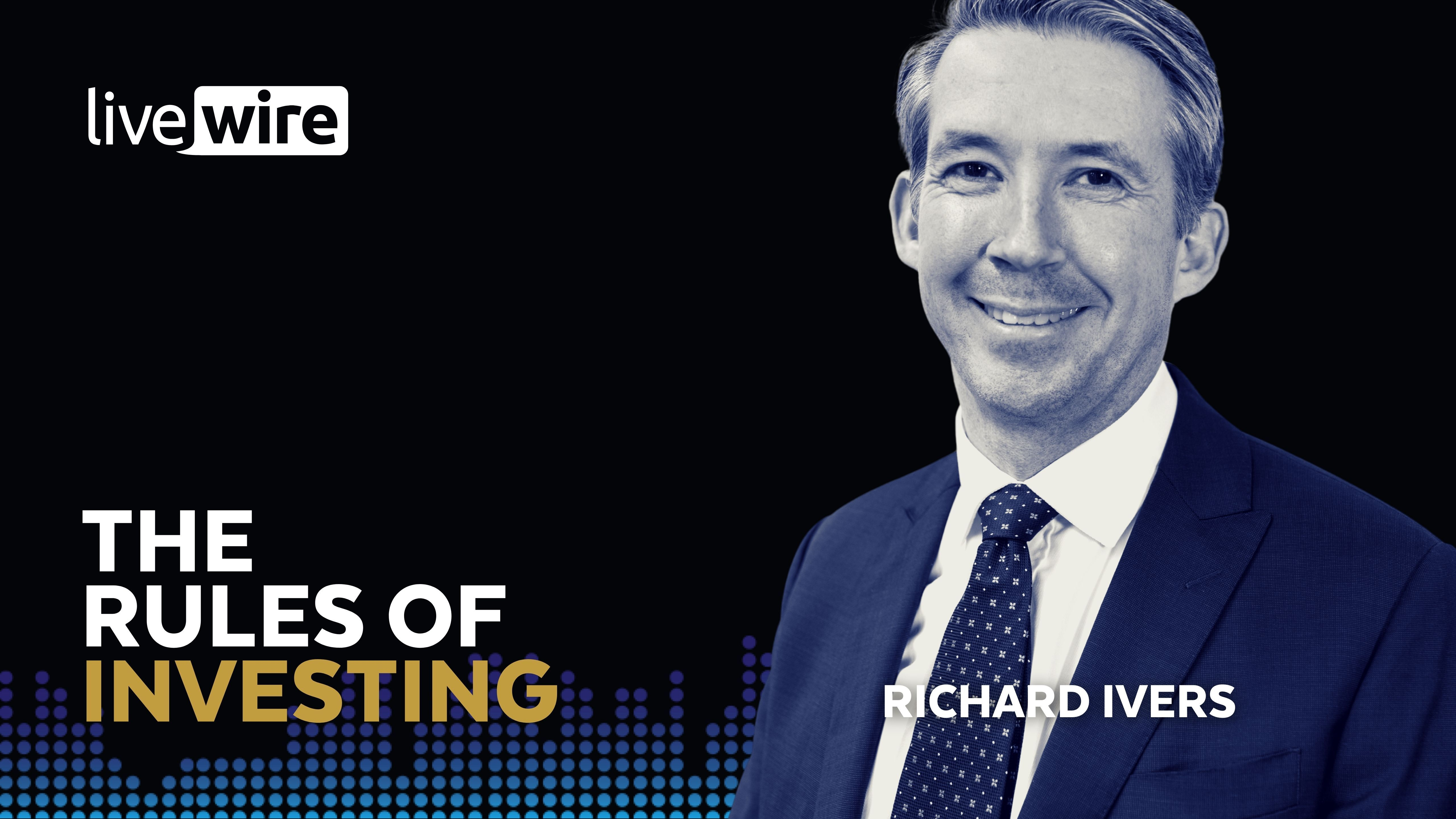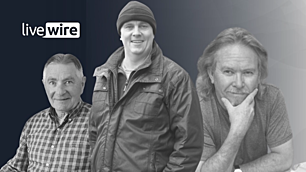Meet Eddie: He's humble and generous with a streak of courage
Eddie, aged 66, is humble, appreciative and generous. Over the years, Eddie has also displayed an above-average level of courage in handling investment allocations and eschewing questionable financial advice.
I recently spoke with Eddie, as part of our Meet the Investor series. The child of refugees from post-war Europe, he’s part of a generation that was raised on frugality and hard work. Having only retired in December, Eddie says he worked many years longer than he expected.
His investing journey, like many others, started with the objective to provide financial security for his family, including his wife and four children. But successful investing has also enabled him to share some of his wealth with others, through his church and through involvement with international aid and development agencies.
Some of the points that resonate most strongly from Eddie’s words are:
- A grateful acknowledgement of the opportunities afforded by being raised and living in Australia
- Be open to new ideas (such as his own embrace of “the green economy”)
- Remain sceptical of so-called experts
- Always question the status quo
- Generosity always beats greed.
In the following interview, Eddie discusses how his investment portfolio has snowballed from properties, through to a dividend-focused self-managed super fund, and into a more diverse but still high-conviction portfolio of around 40 stocks and funds. He details his biggest holdings, the stock calls he got wrong and the lessons learned along the way.
Livewire investor profile
Name: Eddie
Age: 66
Employment status: Retired
Years investing: 38 years
Investment goals: To fund retirement, assist his children and help those less fortunate
Products used: ASX listed shares, LICs and managed funds
Biggest portfolio holding: WCM Quality Global Growth fund

How old are you and how long have you been investing?
I am 66 years old. My first investment was in about 1984 when we left Sydney to go work in the country as a young family. We sold our home and purchased two investment properties in Sydney, geared conservatively while we were out of Sydney doing country service in my public sector job. We expected to return but eventually sold out of Sydney thinking life outside was better. That was a bad decision.
What is your objective from investing?
Objectives change with time. I finished paid work in December 2021, having worked many years longer than I had ever expected.
In 1984 our objective was to provide security for our family and maximise the opportunity to improve our circumstances as a family (we had two kids at that time) with one income. As our kids grew in age and number to four, it was about being able to provide support through education and tertiary study.
As they have become independent, it has been with a view to retirement and being in a position to assist our kids as circumstances warrant it. However, there has also been an underlying objective of being able to be generous to others through the churches we attended, as well as through aid and development agencies and missions we have supported over the years.
As a child of refugees from post-war Europe, I appreciate the opportunities afforded me by my parents being able to come to Australia. I was raised in humble circumstances. We lived frugally and nothing was wasted. It is amazing to reflect that my grandfather was a landless serf before independence from Russia in 1917 and his great-grandson was, for a time, an investment banker on Wall St.
My father worked hard to provide a roof over our heads but died when I was 15. I wasn’t able to complete high school and was working from 17. After I married, I observed my very wise father-in-law who was prudent and established financial security for himself. I learned a lot from him, especially about not being greedy.
My risk appetite is probably higher than average and when I was working, I never went with the flow but was always looking at how things could be done better, and acted accordingly (in the public service, being a risk-taker was unknown before Nick Greiner became Premier). That has reflected my attitude to savings and investments. I am self-taught from reading articles and magazines over many years.
As I look back, having travelled extensively in my last job visiting aid and development projects my agency has implemented, I am aware that the world we live in here in Australia is a bubble. We have been extremely blessed to be born here.
What products do you use to execute your strategy?
In 1988, we sold a Sydney property to fund the purchase of a house on the North Coast, where we expected to remain for some time. We had $10,000 leftover and I sought advice from a financial planner who was trying to sell me the idea of purchasing units in Armstrong Jones Property Trust and gearing 90%, using our $10,000 as equity. After some consideration, I decided I was better off buying something myself. We bought a beachside unit at Byron Bay, kept it a year until interest rates hit 17% and sold at a 50% profit.
Had I invested in AJ Property Trust, I would have lost everything as they went out the back door with the interest rate increase. It was a salutary lesson.
In 2011, after securing a promotion, I purchased a unit at Parramatta and two years later, with my daughter, purchased a second unit (inner city, dual key) where she lived in one. We sold the first unit about seven years later so we could buy our daughter out of her share, rather than pile on more debt. That property has been cash-flow positive since we purchased it and the plan is for it to be an adjunct to retirement income.
After consulting my accountant on whether I had the skills to manage an SMSF, I established this in 2014. Initially, this was super from an accumulation account I started in 1999, thinking my defined benefit fund would not be enough. I rolled this into the SMSF while my wife retained her super in a retail fund.
At first, the SMSF was invested 100% in ASX-listed equities. Since then I’ve added three managed funds and am reviewing the idea of reducing the current direct ASX exposure and increasing the allocation to managed funds.
I started with Bennelong last year and also invested in two Prime Value funds after hearing Richard Ivers on a Livewire podcast (link below) – this highlighted to me the appeal of having skin in the game and modest targets, as Prime Value does.

.jpeg)
Around 65% of our invested capital sits in the SMSF, with the remaining 35% invested in property.
How would you describe your strategy?
I was primarily focused on dividends when the SMSF was first established. But as I expanded out of domestic equities, I realised that capital gain is also income, so have invested in growth stocks as well.
Although the international equities are all ASX listed, investments such as the L1 Long Short Fund (ASX: LSF) also provide significant capital appreciation.
While I was initially sceptical of the green economy, the last year has seen investments in lithium and rare earth companies, which are the only mining stocks in the portfolio.
I have accepted the mantra that mining companies are price takers so have shed all mining stocks including BHP Group (ASX: BHP) which I held for many years from $9 and sold at $35 some years ago.
After the Royal Commission into the banks was announced, I reviewed my wife’s retail fund which had declined slowly (she had been taking the minimum 5% drawdown) and realised the returns were 3.5% after 1.5% in fees was paid.
I always attended, at her insistence, the annual review but apart from questioning the fees once and suggesting various allocations that were outside the scope of the planning company, I really stayed out of it. But after reading two articles, one by Alan Kohler (Ban Percentage Fees to Fix the Advice Industry) and the other by Nicole Pedersen-McKinnon (How Thousands of Financial Advisers Have Dodged the Commission Ban), I challenged them on the commission and platform fees.
Kohler’s description of dealer groups explained how the advice industry operated and I realised I probably had better capacity to provide advice than the average planner. As a result of our enquiries, the planner knocked 0.2% off the adviser fees.
At this stage, my wife decided that her super could be placed into the SMSF as well. I had to be a bit more cautious in allocations, which resulted in expanding the portfolio into as many as 40 stocks. Amazingly, her super has increased in value by 14% over three years after the minimum drawdown, or 27% before the drawdowns, rather than declining slowly in the retail funds. So that has been reassuring.
What are your top five holdings and why do you hold each of these positions?
- WCM Quality Global Growth fund (WCMQ) 10.8%
- L1 Long Short Fund (ASX: LSF) 9.25%
- Telstra (ASX: TLS) 8.8%
- Metrics Income Opportunity Trust (ASX: MOT) 7%
- Washington H. Soul Pattinson (ASX: SOL) 5.3%
WCMQ is an international fund, so increases my exposure to investments outside Australia without owning stocks in the US. It was recommended by Switzer, and I really liked their approach to looking at company culture. I realised from my own work culture that it’s probably the most important asset a company owns. The return from the initial investment has been exceptional.
LSF was recommended by my son, as was MOT, after having to invest with funds from my wife’s retail fund. MOT is a cash option as we hold only 5% in cash. They can be sold when cash is needed. I realise and am comfortable with the risk entailed but the team at Metrics managing this and the Metrics Master Income Trust (ASX: MXT) know what they are doing. Andrew Lockhart, the managing partner of Metrics, was recently interviewed on Livewire, where I have also heard him previously.
LSF is also an international fund and while it was down for a while, it has been phenomenal in the last two years.
TLS is a long-term holding for dividends.
And I hold SOL as a result of Milton, a company known to me since the 1980s when the founder suggested they were a good investment. He has long since passed away and I only invested in recent years, but they pay reasonable dividends.
I realise having 42% of a portfolio in five stocks (plus 17% in three managed funds) concentrates the portfolio and the risk, but the growth and dividends are spread against 28 other listed shares, some of which are speculative. My hope is eventually to reduce to about 20 or fewer stocks and essentially not be as active in reviewing them.
3.8% of the holdings are in 10 shares that are speculative. Some have done well, and others are struggling. This is the fun part of the portfolio.
What’s been your worst investment, and why?
Titan Energy was a mining supply company I bought, primarily for its dividends, when I established the SMSF. It was delisted following the end of the mining boom. The company relisted as Aumake (ASX: AUK), a company selling into China via tourists in Australia. It was a bad investment as I saw the China opportunity and having bought in as a priority investor as a former shareholder in Titan, it tanked after COVID and is down about 95%. It was speculative and reasonable for a small investment, but I saw the China opportunity without the risk and overinvested.
How does Livewire help with your investing process and what tips can you share with other investors about using Livewire?
As mentioned earlier, I invested in two Prime Value funds after listening to an interview with Richard Ivers last year. Having paid for subscriptions previously and being overwhelmed with research and recommendations, I have stopped paid subscriptions (apart from Switzer) because it is always the same. I went from Motley to Morningstar and now essentially Livewire is my main source of news. It is daily, current, and very varied.
Patrick Poke’s interviews are not to be missed. I learned heaps last year from Jeremy Grantham’s interview.
Rudi FV is always interested in technical stuff.
Having a range of commentators and fund managers is fantastic as it shows the divergent views on similar subjects. It is a great learning platform.
Do you have a favourite contributor you recommend other investors follow?
Ally Selby’s interviews on Buy Hold Sell is probably my favourite. It demonstrates the differences each contributor brings with their backgrounds, education, biases and experience. This was most clearly demonstrated recently when the two fund managers had a buy and a sell on Cochlear. Totally different perspectives and something which reinforces that no one is going to get it right 100% of the time.
Ultimately, I am responsible for my own decisions and cannot blame anyone else if I get it wrong. The market is a psychological beast and as I learned during the COVID crash, fight or flight can be the difference between financial health and pain.
I sold out of A2 Milk (ASX: A2M) with a massive profit only to see it rise from $14 to $20 (now $6) and HUB at $15 only to see it rise to $30. Hindsight is a great teacher. And as my father-in-law used to say, “leave some profit for the next buyer.”
What can Livewire do better or what do you dislike about Livewire?
I cannot say anything negative about Livewire. The first podcast I listened to was during COVID and I have really benefited from them. The only negative may be that there is so much stuff to look at but subscribing to only what is of interest is helpful rather than getting a zillion emails every time something new is published.
Is there a lesson you’ve learned as an investor that could potentially help others?
I’ve learned many lessons learned over the years:
- You cannot time the market. I held my breath and nerve in 2020 as COVID saw our portfolio decline by over 30%. I had to remind myself that even if it did not recover, I was still wealthy by world standards, in the top 10% of the world’s wealthiest, so it was a paper loss but … (VIEW LINK). We forget in Australia and the rest of the developed world, how wealthy and blessed we really are.
- Paying tax means you are making money (which is why negative gearing makes no sense).
- Don’t be greedy - sell and take profits. During the dotcom period I had an amazing stock that had increased tenfold, only to fall back very quickly to the price I bought it at.
- Money will give you a better life but remember to use your good fortune to be generous and support others - family, neighbours and charities.
- There is more to learn than the ability to learn everything. Don’t invest in something that you don’t understand.
Can you share a personal passion or ambition you have for your future?
Freedom from paid work, or graduation from paid work as Don Ezra calls it, is a privilege. While I look forward to the normal post-work activities such as travelling with my wife and more time with the grandkids, I plan to be in Tanzania in April assisting the church there in capacity building. While giving money is easy (and easier), giving time and self is of more value to me and an opportunity to be thankful for the benefits I had of being born and raised in Australia. It also develops meaningful relationships with others seeking to make the world a better place.
I will share skills developed over nearly 50 years of education and work to benefit institutions that can develop their communities for the long term. Of course, this would not be possible without the financial freedom to do this. Retirement is a developed world construct, foreign to 90% of the world who work till they die or are cared for by their children. In this context, relationships are of far greater value than devoting all your time to yourself. Certainly, many retired people contribute to their communities here and our social capital would be diminished if not for people giving their time.
Enjoying Livewire's Meet the Investor series?
If you enjoyed hearing about Eddie's investing journey, please give this wire a 'like', and if you know someone who might enjoy the article, why not send them the link.
You can access more of our Meet the Investor interviews by clicking here.
We are looking forward to hearing from more of our readers in 2022. If you are interested in being profiled in our Meet the Investor series, contact us using content@livewiremarkets.com
6 stocks mentioned
1 contributor mentioned


